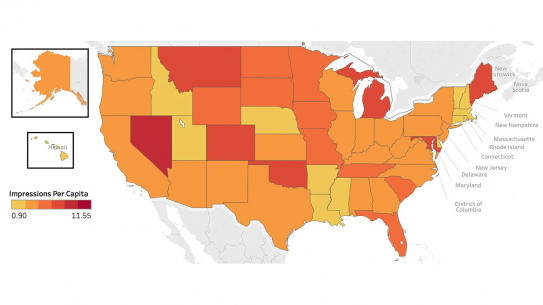Now Transparent: Political Advertising on Facebook, Instagram
NYU Tandon School of Engineering Research Team Tackles Tough Data Science Challenge, Vows to Update Its Public Database Weekly Through November Elections
Donald Trump, Planned Parenthood are Top Advertisers

BROOKLYN, New York, Wednesday, June 18, 2018 – The first in-depth analysis of Facebook political advertising went live today, created by cybersecurity researchers at the NYU Tandon School of Engineering who pledge to improve the transparency of Facebook’s archive by releasing weekly updates of all political advertisements collected through the November election. The team also plans to use its complex data scraping methods to reveal similar information for Twitter.
The Online Political Ads Transparency Project was conceived by Computer Science and Engineering Assistant Professor Damon McCoy to build easy-to-use tools to collect, archive, and analyze political advertising data. Although Facebook became the first major social media company to launch a searchable archive of political advertising, for both Facebook and Instagram, in May 2018, McCoy found the archive difficult to use, requiring time-consuming manual searches. He decided to apply versions of the data scraping techniques he had previously used against criminals, including human traffickers who advertised and used Bitcoin.
McCoy and his team praised Facebook for its pioneering transparency in establishing a public archive and its plan to launch an API – an app interface – that will enable large-scale analysis; however, Facebook has not specified when in 2018 it will launch this API. “We wanted to quickly give voters easy tools to understand who is advertising and what they are advertising, as well as how much is being spent to influence votes and the targets of the ads,” McCoy said.
His team analyzed more than 267,000 political ads that primarily ran between May 2018 and July 2018 and reported:
- Facebook and Instagram users viewed political ads at least 1.4 billion times – and impressions may have reached nearly 3.9 billion. (Facebook’s data provide only ranges.) The NYU Tandon team is quickly adapting its web crawler to add information on videos and images.
- Political spending equaled at least $13.9 million and could have been five times that – the uncertainty is due to the ranges provided in the original data.
- Males aged 25-34 were targeted the most.
- The most ads per capita appeared in Washington, D.C., followed by Nevada, Colorado, and Maine. The fewest appeared in Delaware, Nebraska, and New Hampshire.
- The Facebook archive’s misidentifications – for example, of a political action committee for a person or a political-themed clothing outlet as a political entity – are among numerous hurdles to meaningful and automated analysis.

Top political advertisers and their minimum impressions and spending:
- The Trump Make America Great Again Committee: 4,127 ads, 26.4 million impressions, $190,400
- Planned Parenthood Federation of America: 3,389 ads, 24.5 million impressions, $188,800
- AAF Nation, LLC (manufacturer of political-themed clothing): 862 ads, 18.4 million impressions, $78,900
- National Rifle Association: 213 ads, 18.3 million impressions, $58,000
- Beto for Texas (Democrat running for Senate): 377 ads, 13.0 million impressions, $194,400
- Priorities USA Action and Senate Majority PAC: 2,794 ads, 12.9 million impressions, $120,600
- NowThis (liberal-leaning media company): 35 ads, 11.6 million impressions, $7,400
- Donald J. Trump for President, Inc.: 5,396 ads, 11.3 million impressions, $83,700
- 4Ocean, LLC (focused on reducing ocean pollution): 78 ads, 10.6 million impressions, $68,200
- Care2 (creates social networking around causes): 557 ads, 10.1 million impressions, $99,900
The data also revealed substantial online advertising by candidates in congressional and state races.
A significant number of ads – 43,573 – did not comply with Facebook’s new requirement that political ads list sponsors and were therefore shut down, but the NYU researchers’ daily archiving captured these “unvetted sponsor” ads. The researchers noted that some of the offenders may have been caught off guard by the policy change. They also noted that while Facebook reduced the time it takes to shut down these ads from 26.4 days to 5.6 days, the delay remains longer than the ads typically run.
The team reported the top five unvetted sponsors as identified by Facebook and their minimum impressions and spending:
- American AF: 253 ads, 8.2 million impressions, $103,800
- National Rifle Association of America/NRA: 56 ads, 7.9 million impressions, $78,500
- I’ll Go Ahead and Keep My Guns, Thanks (listed as a media company): 26 ads, 7.6 million impressions, $120,300
- China Xinhua News: 44 ads, 6.8 million impressions, $6,000
- Walmart: 18 ads, 5.8 million impressions, $51,900
Collaborators on the Online Political Ads Transparency Project are NYU Tandon doctoral student Laura Edelson and NYU Shanghai visiting undergraduate student Shikhar Sakhuja. Visit the project at https://online-pol-ads.github.io and download the data at https://github.com/online-pol-ads/FBPoliticalAds/tree/master/RawContentFiles.
Images at http://dam.engineering.nyu.edu/?c=2106&k=8e2ca17c9d
About the New York University Tandon School of Engineering
The NYU Tandon School of Engineering dates to 1854, the founding date for both the New York University School of Civil Engineering and Architecture and the Brooklyn Collegiate and Polytechnic Institute (widely known as Brooklyn Poly). A January 2014 merger created a comprehensive school of education and research in engineering and applied sciences, rooted in a tradition of invention and entrepreneurship and dedicated to furthering technology in service to society. In addition to its main location in Brooklyn, NYU Tandon collaborates with other schools within NYU, one of the country’s foremost private research universities, and is closely connected to engineering programs at NYU Abu Dhabi and NYU Shanghai. It operates Future Labs focused on start-up businesses in downtown Manhattan and Brooklyn and an award-winning online graduate program. For more information, visit engineering.nyu.edu.




